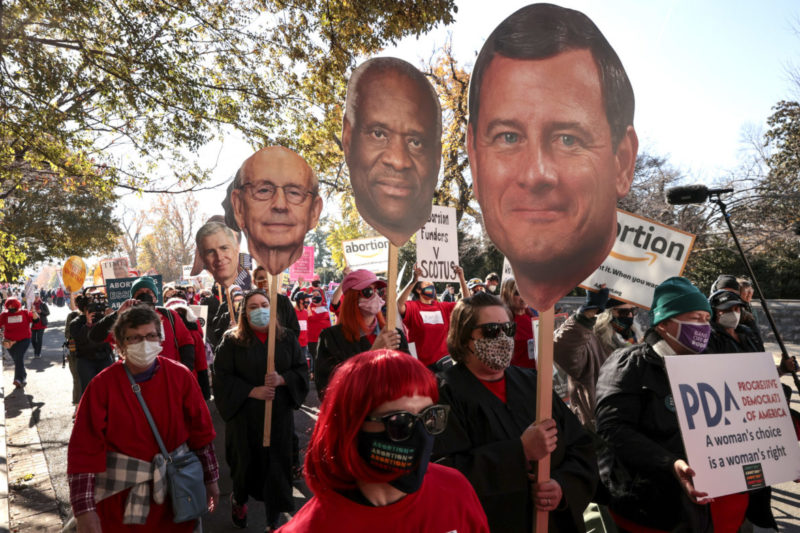Don’t Fall for the Abortion Okey Doke
When it comes to the impending reversal of Roe, I fear the country will want to believe it’s not going to be "that bad." But it's going to be that bad.

In my nightmares, I wake up the day after the Supreme Court has reversed Roe v. Wade, sparking a national human rights crisis that will have devastating consequences, and the first headline I read in a major publication says, “Supreme Court Preserves Abortion Rights in Dobbs v. Jackson Women’s Health Organization.”
And then the first line of the article reads, “In a 6-3 decision, the Supreme Court has upheld Mississippi’s 15-week ban.”
From the headline about “preserving abortion rights,” the conversation turns to the benevolence of the Court in permitting abortion to remain legal up to 15 weeks’ gestation.
After nine months of Roe barely remaining on life support in Texas—thanks to the state’s bounty hunter law, SB 8—the fact that the Supreme Court will have finally deigned to explain why Roe v. Wade is no longer good law will be swept aside in favor of a narrative that casts feminazi “baby killers” as hysterical for spending a year gravely pronouncing that Roe would be reversed.
“Roe wasn’t reversed!” they’ll scream on Twitter. “You were worried about nothing!” And that narrative will be used to cast further doubt on other ongoing cultural and moral panics, particularly the resurgence of the “gay people are pedophiles and groomers” Lavender Scare and the near-constant demonization of trans people.
I fear a world where the media is manipulated into shifting the narrative in Dobbs v. Jackson Women’s Health because too many journalists have not spent the time required to understand the gravity of the human rights crisis that will kick off this summer. (And those who haven’t are concocting truly terrible ideas about podcasting conversations with “the other side,” which will not, in fact, lead to some Grand Understanding of Abortion but simply give a mainstream platform to regressive anti-choice talking points not grounded in science.)
I fear that this country will want to believe it’s not going to be “that bad.” But it is going to be that bad. It’s already that bad in Texas. And Oklahoma. And Kentucky.
The urge to downplay the human rights crisis won’t just come from the right. There will be plenty of progressives—people who ostensibly believe a person should never be forced to carry a pregnancy to term—who will pooh-pooh the end of nearly 50 years of abortion rights law because “at least people can still get abortions at 15 weeks.”
Anti-choice advocates are counting on it. They’re counting on progressives being blasé about the decision that’ll come any week now, the way progressives have been blasé about abortion rights for a decade as those on the right, starting with the Tea Party explosion in 2010, began to laser focus on criminalizing abortion, all the while pretending that’s not what they were doing.
Anti-choice advocates, aided by the media and pundit class, will gaslight us into believing things aren’t as bad as they are. And just when we’ve gotten used to the new normal, they’ll strike again. That’s when fetal “personhood” will raise its ugly head. That’s when a national abortion ban will be on the table.
Are you prepared to be gaslit? Are you prepared for the lies and obfuscation?
I hope you’re ready for it because it just might happen. And I want to give you the means to combat it. It’s a simple tool, really, just one simple sentence.
Let me explain:
If the Supreme Court upholds Mississippi’s 15-week ban, the Supreme Court will have reversed Roe v. Wade.
That’s it. That’s the simple sentence. If you remember one thing, remember that.
Under Roe, a pregnant person has an absolute constitutional right to get an abortion up until fetal viability. That’s the point when the fetus can survive on its own outside the womb. Sure, states can throw up roadblocks—mandatory counseling or forced ultrasounds—but ultimately, under Roe, a state cannot forbid a person from getting an abortion.
Mississippi, which did not dispute the fact that a fetus is not viable at 15 weeks, asked the Court to determine whether its 15-week ban was constitutional under current law. That should have been the end of the discussion. But it wasn’t. Once the makeup of the court changed and Amy Coney Barrett ascended to the bench, Mississippi basically said, “You know what? We changed our minds. You should just reverse Roe.”
And that’s what the Supreme Court is expected to do.
So when you wake up the day after the Court issues its ruling in Dobbs v. Jackson Women’s Health, remember that.
